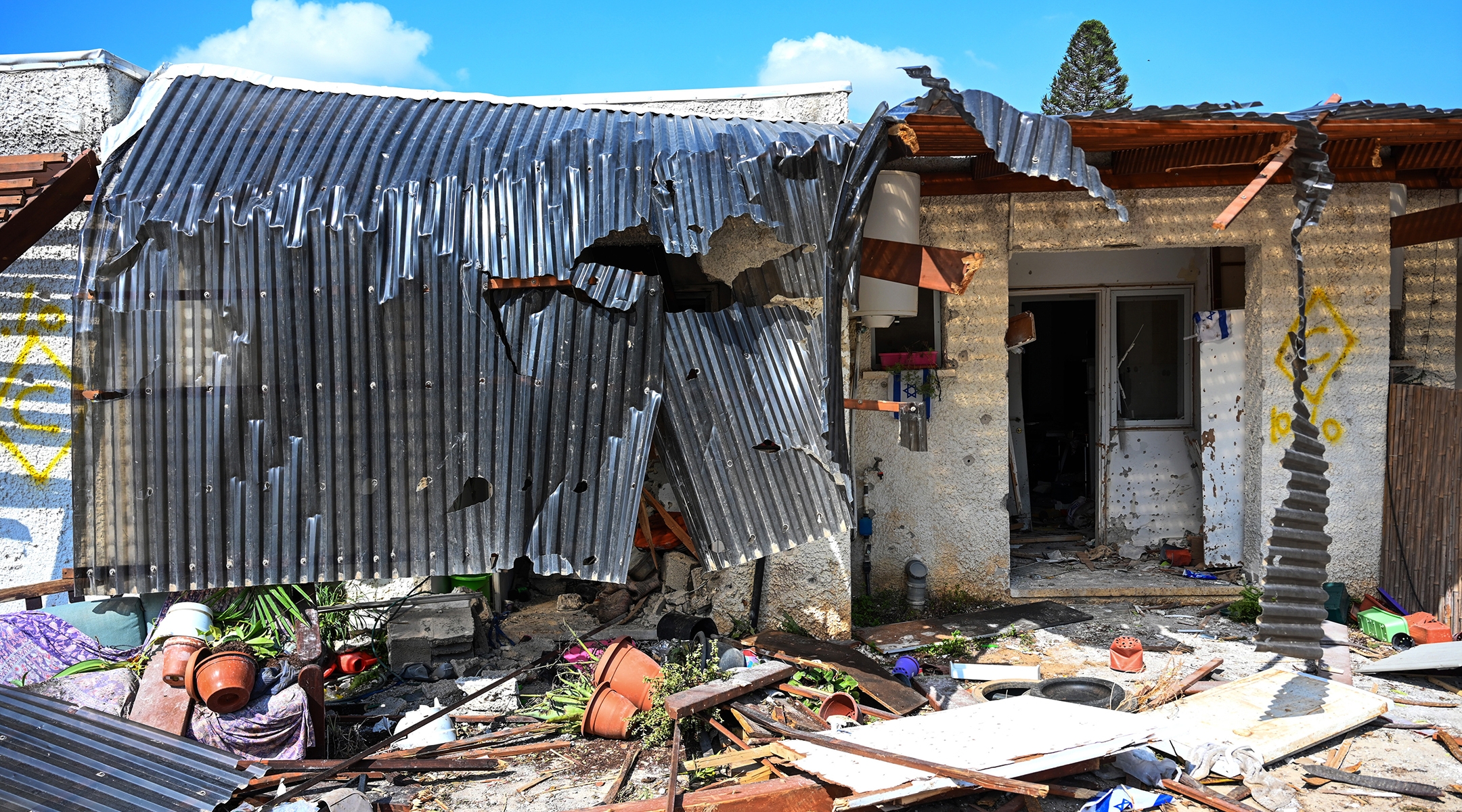Where US Jews can donate to support Israel’s hospitals, troops, survivors and more
The news from Israel has inspired many American Jews to give

A house lies in ruins after an attack by Hamas militants in Kfar Aza, Israel, Oct. 10, 2023. (Alexi J. Rosenfeld/Getty Images)
(JTA) — For many American Jews, watching the scenes of horrifying violence and trauma emerging from Israel has awakened an impulse to help or give to the sweeping aid effort underway now.
We’ve rounded up some of the needs that nonprofits and individuals have shared, as well as organizations working to address them. Please note that you should always do your own research before donating to any organization.
Israeli hospitals are dealing with a surge of wounded patients and some have been damaged by rockets or in fighting. Many depend on donations even in normal conditions, making the need more acute now.
- Barzilai Hospital in the south sustained rocket fire while serving patients. Over the past few days, it has been inundated with more than 450 victims being brought in.
- Hadassah hospital is treating victims of the attacks, including many soldiers, and launched a crisis campaign to raise needed funds.
- Soroka Medical Center has already treated 700 severely wounded victims and the center is seeking donations for its emergency fund to ensure the acquisition of essential medical equipment.
Israel’s robust volunteer emergency services providers, which have been first responders through a variety of crises, have been on the front lines since the attack began.
- American Friends of Magen David Adom, Israel’s version of the Red Cross, has been providing emergency aid and information since early on; one of its drivers was killed responding to the attack. Bloomberg is now matching donations.
- United Hatzalah has more than 1,500 volunteers serving near Gaza right now. At least one volunteer with the group was killed in Saturday’s fighting, it said.
- ZAKA has special expertise in retrieving bodies from disaster scenes; the group announced on Sunday that it had retrieved 250 bodies from the scene of the festival that was attacked early in the onslaught.
- Lev Echad–One Heart organizes a network of volunteers during national emergencies. It says it has deployed 30,000 volunteers but needs help to get 100,000 to work.
The Jewish federations system operates local federations in hundreds of communities across North America, soliciting and distributing donations based on the needs and interests of their constituents. From Los Angeles to Indianapolis to New York (which has allocated $10 million to the aid effort), many have announced special funds in the wake of the attack. The Jewish Federations of North America, the umbrella organization, is also collecting funds to support victims in Israel.
The Giving Back Fund is making funds available to purchase plane tickets for Israelis abroad who want or need to return to serve in the army. But other Israelis abroad are on their own if they want to fly home — and with flights canceled and demand high, prices have skyrocketed.
Some organizations and informal efforts are working to make sure that Israeli soldiers have what they need to stay safe during what they’ve been told could be a prolonged campaign. While the Israel Defense Forces say it has adequate supplies, families sent off their soldiers and reservists with little advanced warning and, in some cases, concerns about whether the army is prepared to take care of them.
- Bayit Brigade is raising emergency funds for lone soldiers, a term used to describe immigrants and volunteers mostly from abroad who enlist without a familial support network in the country.
- Belev Echad is a veterans group raising funds to distribute bulletproof vests and helmets.
- Friends of the IDF is a non-military organization that supports soldiers, veterans and their family members.
- Latet is aiding the security forces on the front line with emergency aid kits containing food and hygiene products.
Mental health resources are also much-needed at this time. Helplines are getting an unprecedented number of calls from people mentally and emotionally affected by the war.
- NATAL: Israel Trauma and Resiliency Center — NATAL is an apolitical crisis help organization that has been around since 1998 and helps those affected by trauma from war and terrorism.
- ERAN — ERAN is Israel’s mental health crisis hotline. Founded in 1971, it provides “emotional first aid” to anyone who needs it.
- One Family Fund is offering emergency grief and trauma counseling to all victims and survivors. Their employees and volunteers are visiting the injured in hospitals, cooking food for victims in areas of attack, and attending funerals before supporting the families of victims.
- Bayit Cham has established a fund to provide free therapy for 1,000 children from the Gaza border area.
Other fundraisers are underway for communities hit hard by the attacks.
- Shinua Chevrati: Operation Delivering Light is mobilizing to help deliver material goods to Israelis forced to flee their homes in partnership with BIG, the largest retail conglomerate in Israel.
This article originally appeared on JTA.org.



















